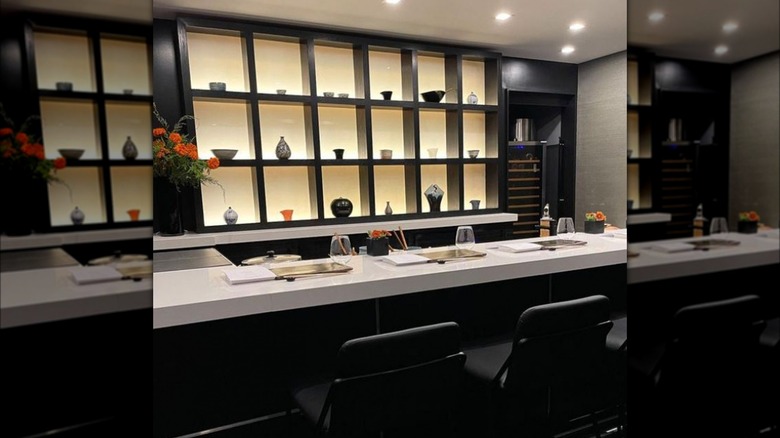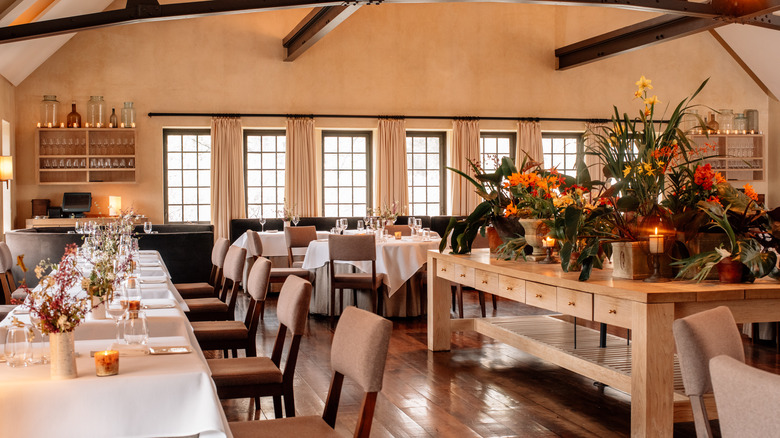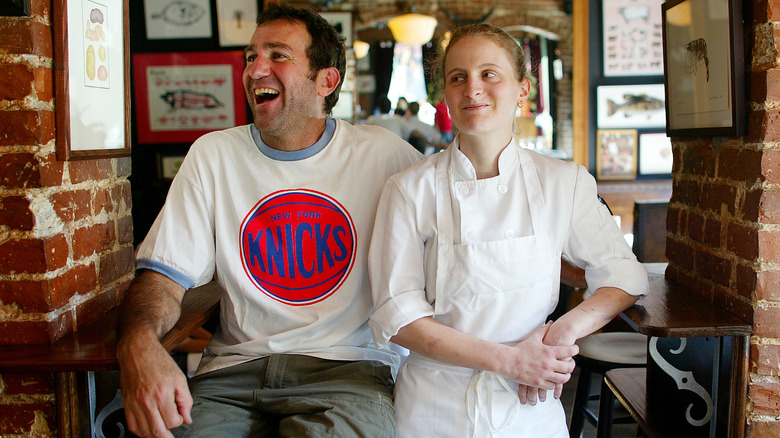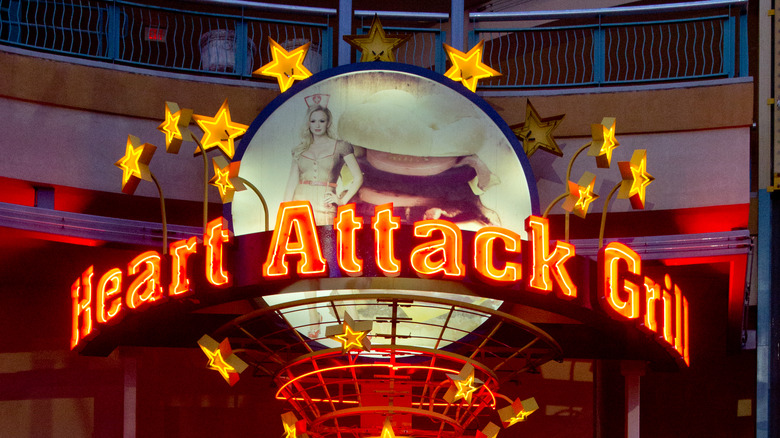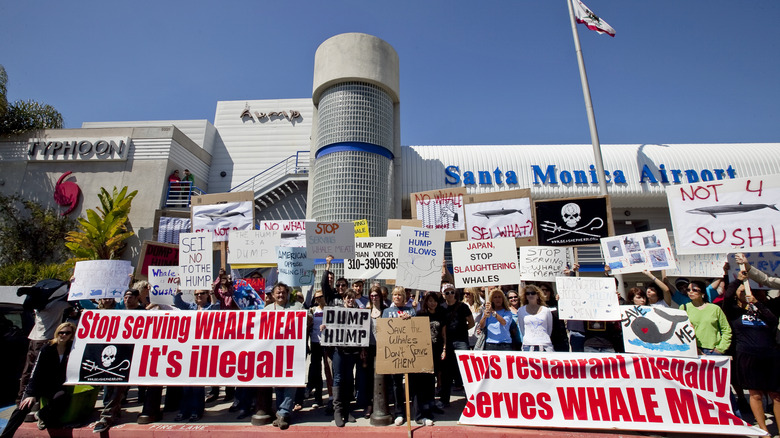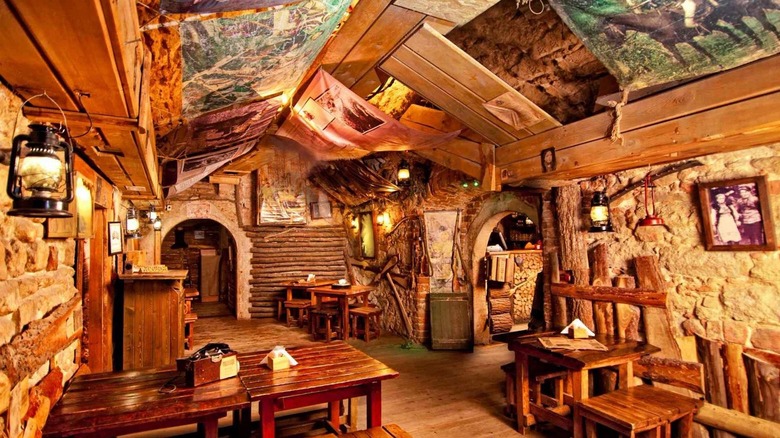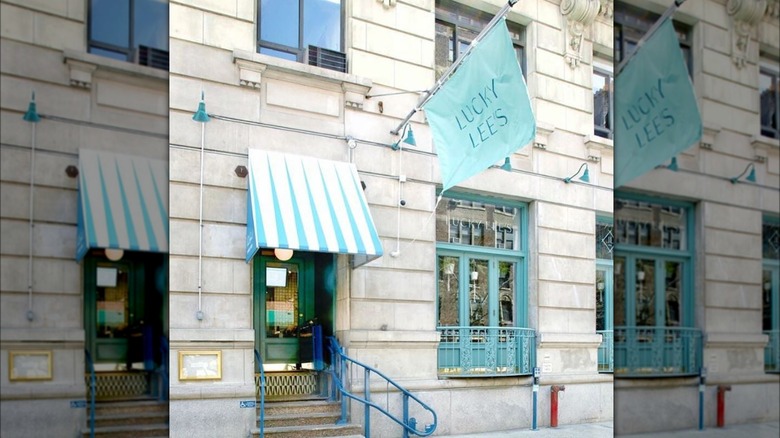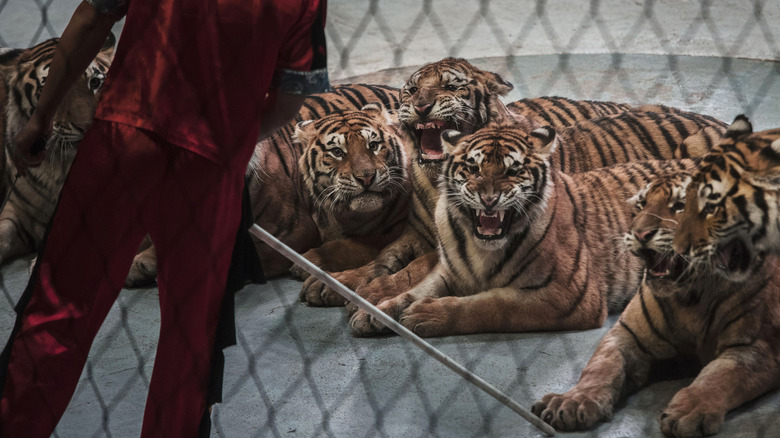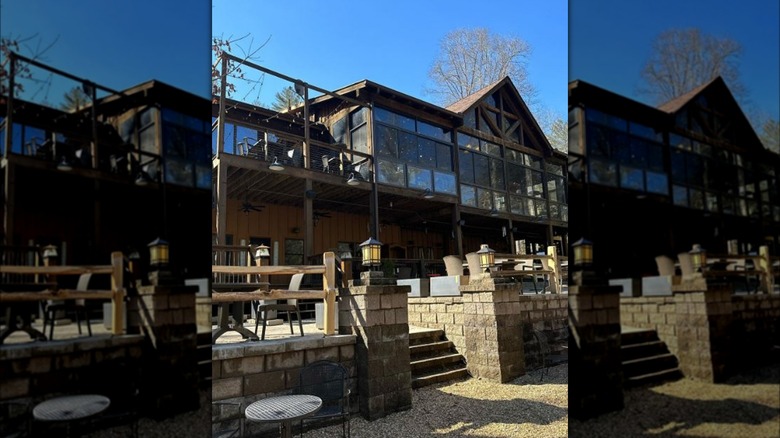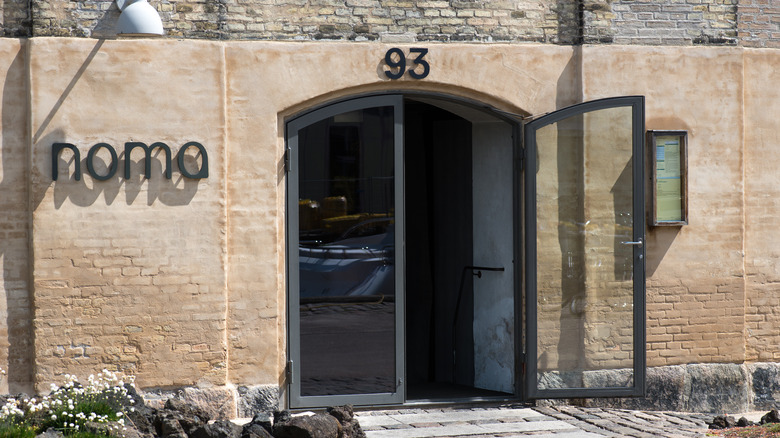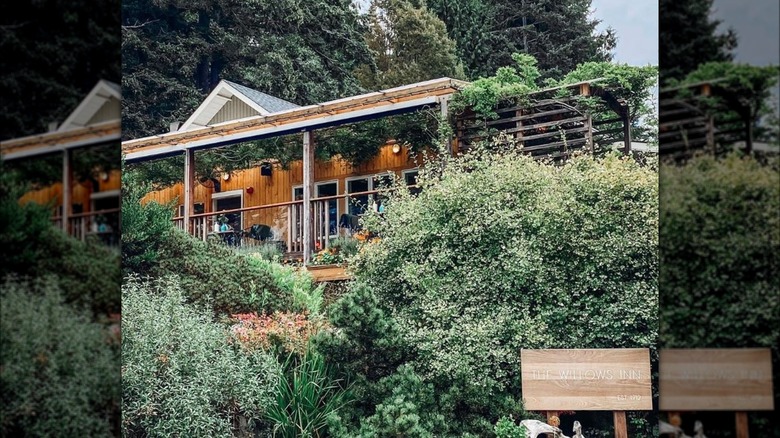The World's Most Controversial Restaurants
The restaurant industry is fertile ground for scandals, and most long-running restaurants cannot fully avoid controversy. As food is central in this business, issues often relate to poor quality, unsustainable practices, questionable hygiene, and poor nutritional value. But more problematic controversies stem from political affiliations, discriminatory practices, harassment, cultural insensitivity, and underpaid staff that should be the driving force behind each restaurant. At a time when news and social media can easily make or break a business, any mishap faces rigorous scrutiny, and even minor incidents quickly escalate into major scandals. Ultimately, how the establishment reacts to these happenings will also significantly affect its reputation.
This list covers controversial restaurants that were publicly shamed for their practices but still somehow managed to survive, and those that could not stay afloat following painful humiliation. Not all scandals are equally severe, but they all attracted much negative attention, not only to the restaurant in question but sometimes to the industry as a whole. However, they can all be a good lesson for everyone in the business and perhaps ignite a broader discussion that will move the industry forward.
Sushi Nakazawa
Sushi Nakazawa was founded by Alessandro Borgognone. After watching Jiro Dreams of Sushi, the magnificent documentary following sushi master Jiro Ono and his tireless pursuit of the ultimate sushi expression, Borgognone was determined to track down one of the apprentices featured in the documentary. He landed on Daisuke Nakazawa, who was doing a stint in Seattle, and the two eventually became partners and opened the first restaurant in West Village. Sushi Nakazawa soon became one of the most acclaimed sushi joints in NYC, and was awarded an outstanding four-star review in the New York Times and the prestigious Michelin Star. The impressive sushi quality was never an issue at this upscale restaurant, but ties with former president Trump and the announcement that the second location will open at the Trump International Hotel in Washington, D.C. caused a serious backlash.
The home of the second location was revealed in 2016, soon after Trump's controversial speech in which he blatantly insulted Mexican immigrants, causing a lot of negative reactions. This was especially controversial as the Mexican workforce is essential for American restaurants, and Borgognone's decision sparked controversy among the most influential in the industry.
Regardless of strong criticism, Nakazawa's team was determined, and the restaurant opened in 2018. Despite the controversy, both locations have stayed in business, and all the negative press has apparently not affected the success. In 2019, the Washington location received its first Michelin Star, proving that the critics do not dwell much on political ties.
Blue Hill
Blue Hill at Stone Barns is an acclaimed restaurant operated by the Barber family. It is set in an idyllic location 30 miles outside NYC at a former dairy farm. The ingredients are locally sourced from the Hudson Valley, and there is no classic à la carte menu, just a tasting option featuring dishes that showcase the beauty of locally sourced produce. Blue Hill opened in 2004, and was generally well-received by critics and the public. The reviews praised the philosophy, sustainable practices, ingenuity, and perfectly executed dishes, often described as a benchmark for all fine-dining establishments in the U.S.
This idyll was disrupted by a shocking three-piece editorial published on Eater in 2022 that would ruin the perfect image of the restaurant and the head chef, Dan Barber. The accusations made were severe. Former apprentice John Schaible claimed he was molested by one of the managerial staff members and was devastated when he got no protection or backup from the management. Eater spoke with almost 20 former employees, and their general sentiment told a story of pure disappointment that a place promoted as a revolutionary culinary haven essentially functioned as a brigade with brutal hours and overwhelming pressure. Other allegations included unsustainable practices not in line with the restaurant's ideology, including animal products in vegan and vegetarian options, dangerous working conditions, and a sexist atmosphere. Though the accusations made a lot of noise, Blue Hill weathered through it, and in 2023, Michelin again confirmed its two-star status.
Spotted Pig
Spotted Pig was one of NYC's buzziest restaurants. The place was opened in 2004 by Ken Friedman and April Bloomfield and was known as a celebrity hangout and a gastropub with unpretentious dishes that was even awarded a Michelin Star. For a while, this hotspot seemed to get everything right, but in 2017, both Friedman and Bloomfield faced severe accusations.
In a shocking New York Times article, 10 female employees confirmed Friedman continually sexually harassed them by inappropriately touching and kissing them in public and sending elusive text messages. Many also said that groping was standard at private parties that took place at the designated area on the third floor that earned the nickname "the rape room." Bloomfield was not involved in these accusations, but victims claimed she knew of misconduct and criticized her lack of reaction. Mario Batali was one of the most prominent names involved in the scandal and was mentioned as a frequent guest who would regularly harass female staff. Following the accusation, the Attorney General started an investigation. In January 2020, it was confirmed that the "female employees were subjected to severe and pervasive incidents" and that Friedman and 11 former employees agreed on the $240,000 settlement.
Spotted Pig did not manage to survive the controversy. The place was closed in 2020, just weeks after the settlement. Friedman and Batali never recovered from the accusations and public embarrassment, but Bloomfield resurfaced in 2023 with Sailor, a charming Fort Green bistro with a promising future.
Heart Attack Grill
Heart Attack Grill is just as you imagine it to be — a restaurant serving excessive portions that could send you to the hospital. It was opened in 2005 by Jon Basso who decided to go with the hospital theme. Customers are referred to as patients, the food is described with medical jargon, and part of the offer includes a wheelchair service for those who successfully tackle the most caloric burger in the world.
Heart Attack Grill is a place that promotes unnecessary and disturbing gluttony. There is little talk about the quality of food here. The burgers are made well-done and each item on the menu is pushed to the extreme, so you'll find fries made in lard and calorie-packed Butterfat Milkshakes. The food is merely a gimmick to attract attention, which is not something that is normally approved in the industry.
Though the idea seems controversial, Heart Attack was often called out for female uniforms that are evocative of the naughty nurse narrative. However, the most scandalous headlines relate to the death of 575-pound Blair River, the restaurant's spokesperson, who died at age 29. In 2012, a customer had a heart attack while dining at the restaurant, and what's even more shocking is that the staff and the customers weren't aware of the severity of the situation and thought of it as a stunt. A series of other scandals and restaurant-related deaths and incidents followed, but nothing seemed to convince Basso to reconsider the strategy.
The Hump
The Hump was a Santa Monica restaurant specializing in sushi and other seafood delights. The establishment functioned without serious scandals and was generally praised by the patrons for the freshness of ingredients and the overall quality. However, this all changed in 2010, when an Oscar-awarded documentary exposed the establishment for selling and serving whale meat.
Whale meat is allowed and regularly consumed in several countries, but in the U.S., trade and consumption are strictly forbidden as whales are classified as endangered. In 2009, a group of activists filmed "The Cove", a disturbing documentary tackling the Japanese cruel dolphin hunt. Their investigation also led them to the U.S. coast and The Hump, where they discovered that the restaurant served whale meat as a part of omakase — a unique selection of dishes prepared by the sushi chef. The accusations proved true as DNA showed that the pink slabs clandestinely stashed by diners were whale meat. The restaurant faced federal charges, and the aftermath was a $27,500 fine settled by Brian Vidor and Typhoon Restaurant Inc. Besides being illegal, serving whale meat is deemed morally wrong, and unsurprisingly, The Hump closed soon after the allegations were brought to light.
Kryjivka
Kryjivka is a quirky, war-themed restaurant located in Lviv, Ukraine. Though it's one of the city's must-visit places, this is a secret establishment, so you need to do some research to find it. Though it is centrally located, you'll have to enter via a secret door, past a scary guard who'll give you a shot of vodka and ask you for the secret password. You'll walk into a large basement area packed with war-inspired paraphernalia.
Kryjivka is not problematic for its food — quite the opposite; most reviews praise the menu and reasonable prices. The controversy mainly concerns its nationalistic theme and grim history. The place was initially used as a bunker by the Ukrainian Insurgent Army, which was mainly fighting Soviet and German occupation during and in the aftermath of WWII. The main goal of the Army was to achieve a unified Ukrainian state. Though Ukrainians mostly justify and celebrate its legacy, the Army has been involved in brutal conflict with Poles in the Volhynia region. Historians estimate that around 60,000 Poles were killed during this time to keep the Ukrainians dominant and ensure that the region stayed within Ukraine's borders. The conflict has never been entirely resolved and remains a source of tension between the two nations, so it is not surprising that Kryjivka — a place that celebrates its patriotic nationalism — has been criticized.
Lucky Lee's
Lucky Lee's was a short-lived restaurant that opened in Greenwich Village in 2019. From its beginning, the restaurant attracted a lot of negative attention. It was opened by Arielle Haspel, a certified health coach who promotes the idea of clean eating and food alternatives that are more wholesome and more beneficial for health and well-being. Though this lifestyle is certainly commendable, Haspel got a lot of bad press when she wanted to apply the same principles to Chinese cooking at Lucky Lee's.
The name of the restaurant was the first red flag. Haspel is Caucasian and opted for an incredibly clichéd name for an establishment serving Asian fare. Perhaps her idea wouldn't create so much negative buzz, but in an Instagram post that has since been deleted, Haspel provided a horribly inappropriate and borderline racist description of her motives. As The New York Times reported, she explained that the driving force behind the idea was to offer Chinese food that would not make people feel "bloated and icky" and one that would not be overly oily or salty. Deservingly, the comments gained a lot of negative press, and Haspel has been accused of blatant cultural appropriation by implying that Chinese food is somehow bad and unhealthy. The restaurant was not able to live on and was closed in December 2019.
Restaurant at Xiongsen Bear and Tiger Village
Xiongsen Bear and Tiger Village is a highly controversial animal park in Guilin, China. It covers a vast area and claims that it encompasses several animal-related activities such as conducting research, breeding animals, and providing entertainment. It's home to numerous wild and endangered species, such as tigers, black bears, lions, leopards, snakes, and monkeys. The park has long caused controversy for animal shows performed on the premises. The reports often described the horrible mistreatment of tigers that are poked, provoked, and badly tortured in order to do tricks and keep the guests entertained. As if this is not enough, it also included a controversial restaurant accused of serving tiger meat.
In 2007, the Conference on International Trade in Endangered Species (CITES) issued a statement confirming that Xiongsen featured tiger meat on its menu. ITN network first warned about the practice and had DNA evidence to support the claims, and CITES later confirmed that an additional test in the U.S. corroborated the results. All the negative publicity that followed had a positive impact as the restaurant and accompanying shop selling questionable products ultimately closed.
Toccoa Riverside Restaurant
Toccoa is a charming restaurant offering romantic riverfront dining and classic American fare, with rainbow trout as the recommended house special. At first glance, there is nothing controversial that stands out. The reviews are mainly decent, praising the food, hospitable staff, and cozy atmosphere, but if you do some more research, you'll notice a series of negative comments, mostly commenting on the restaurant's stance towards children's behavior. A glance at the restaurant's menu immediately reveals the controversial clause listed as "Adult surcharge: for adults unable to parent," followed by a triple dollar sign, implying that children's bad behavior will lead to a hefty charge for the parents.
Unsurprisingly, the practice has sparked a lot of controversy. One dissatisfied customer shared the experience, explaining that their party, which included 11 children, was charged $50 because the kids were supposedly too loud and unruly. The discussion was also brought to other platforms, and many commented on other charges on the menu, such as the additional cost for card payments added to the prices listed on the menu.
Adding surcharges for unruly kids is not illegal but can be classified as rude and disrespectful. Then again, you will also see some customers praising the idea and encouraging the management to stick to their philosophy. The restaurant got some free press, but whether it's bad or good is yet to be seen.
Noma
Copenhagen's Noma does not need much introduction. This revolutionary establishment belongs to the classic culinary canon. It was awarded three Michelin Stars and set a record with five titles as the World's Best Restaurant. Apart from being the place for the perfectly orchestrated dining experience, it was also a hub for training young, creative talents. The founder, René Redzepi, is one of the pioneers who gave momentum to fine dining that focused on local, foraged ingredients and made it into what it is today. Despite all the brilliance, Noma could not avoid controversy and was mostly criticized for relying on unpaid interns, though Redzepi changed the practice in 2022. The biggest scandal was the shocking announcement that Noma would permanently close by the end of 2024.
The news was shocking as Redzepi claimed that keeping Noma alive is no longer sustainable. The system where the meal costs $500 cannot function successfully and pay the staff fairly. This is especially worrying as Noma was an example and a model for many fine dining establishments that popped up around the globe. The news hit like an avalanche, posing the question of the future of haute cuisine. How can other, less popular places survive if the most successful restaurant can no longer stick to sustainable practices? Redzepi's legacy should not be diminished, but the news is a warning for similar establishments to reevaluate their methods and reshape the fine dining model to make it more sustainable for everyone involved.
Willows Inn
Willows Inn was an idealistic fine dining haven in the Pacific Northwest. The picturesque restaurant was located on the remote Lummi Island, and the diners had to catch a ferry to reach it. Once on the island, they would be welcomed by a serene atmosphere, beautiful scenery, and a multi-course meal prepped by Blaine Wetzel, an aspiring, award-winning chef who applied Noma's cooking philosophy at Willows Inn. Enthusiasts and professionals praised the restaurant, but the success story abruptly ended when the establishment got swamped with lawsuits.
The restaurant first got some negative press in 2017 when it was announced that it would have to cash out $149,000 to compensate for the grossly underpaid internships. In 2021, after a long legal battle, the restaurant had to settle and pay out $600,000 for breaking the labor laws. The same year, The New York Times published a shocking article revealing allegations made by more than 30 former employees who claimed that Wetzel harassed, abused, and created a toxic work atmosphere built on a culture of fear. Female staff described the experience of blatant sexism and sexual harassment by male staff members, and the employers confirmed that guests were often misled about the origin of the ingredients. The class action lawsuit that was filed by 137 employees was eventually settled, and Willows Inn was ordered to pay $1.37 million in damages. The restaurant kept running for several seasons amidst the scandals but permanently closed in 2022.
Nusr-Et
Nusret Gökçe, best known for the Instagram persona Salt Bae, became an internet sensation in 2017 following a viral video in which he dramatically sprinkled salt over a steak. The video turned him into a global star, which resulted in a chain of international restaurants. Gökçe promoted a narrative of an incredibly successful restauranteur and a cosmopolite, but the descriptions of his former employees told a different story which exposed a much darker side of his persona and questionable leadership methods.
Insider talked with nine people who worked for Gökçe, and they gave a more accurate portrayal of the chef who enjoys the glitzy lifestyle and likes to brag about it on social media. Most complaints revolved around Gökçe's management style, which they describe as aggressive, often accompanied by frivolous decision-making, which made the employment uncertain and could lead to instant terminations. Insider mentions the extensive list of past and current lawsuits and complaints that contain reports by female staff about sexist treatment that was not on par with male staff members and discrimination based on nationality. The reports also suggest that management maintained the image of lux and glamour but that it was just a fake façade. The list of objections goes on, and though many of Gökçe's establishments are still open, it is yet to be seen how this instant business success will match up with the relentless flow of complaints associated with its name.

